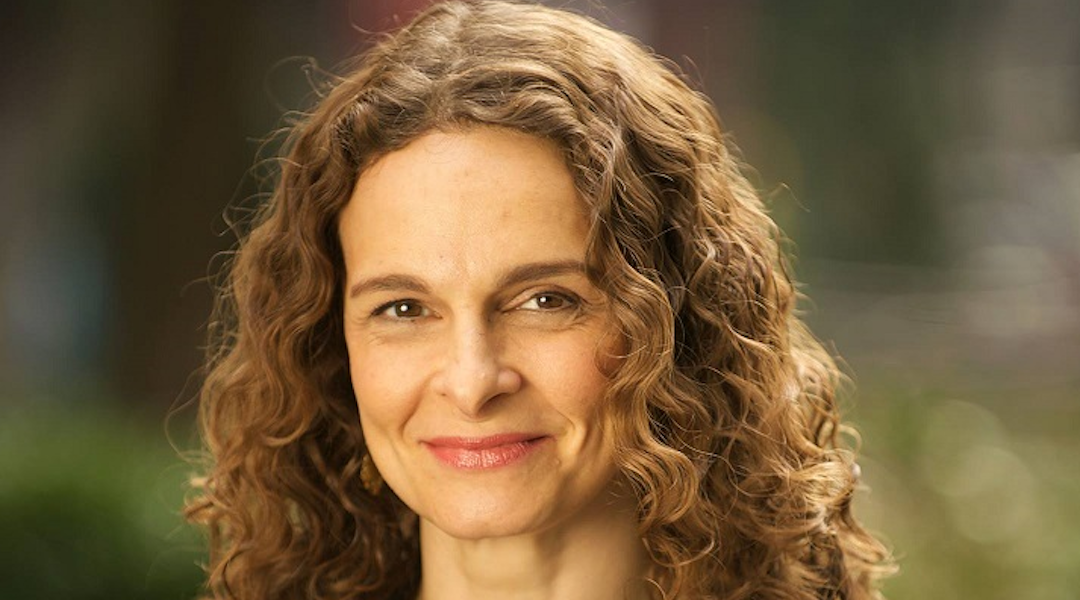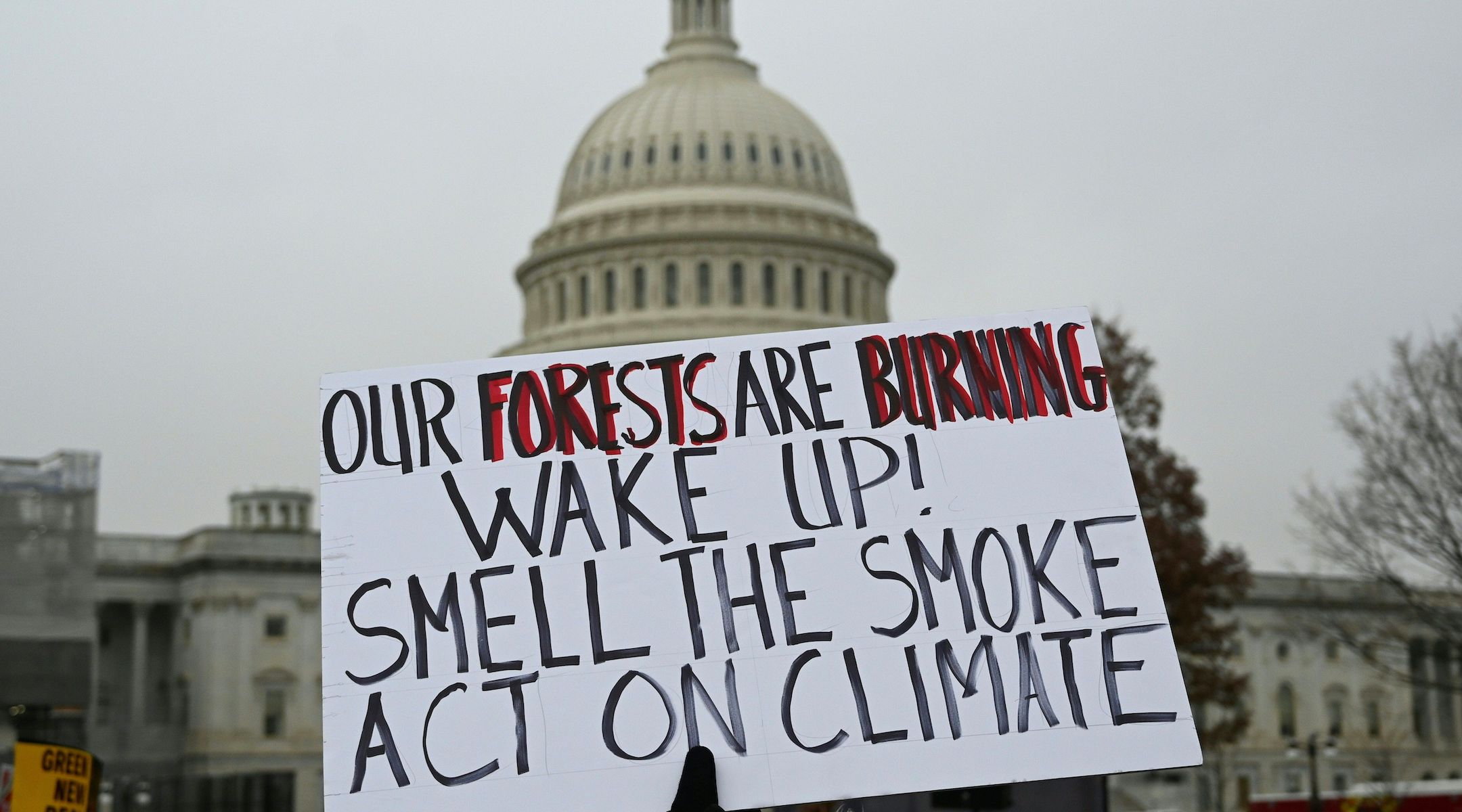NEW YORK (JTA) — Rabbi Jennie Rosenn has spent most of her career working on Jewish social justice causes. Until recently, however, there was one issue that didn’t resonate as strong.
“The environment was something that I knew was important, but I wasn’t passionate in my kishkes [gut] about it the way that I was other issues,” said the New-York based rabbi, who until 2017 led community engagement for the Jewish refugee resettlement group HIAS.
That changed over the last few years, especially after Rosenn experienced a heat wave firsthand one summer in the San Francisco Bay Area “that felt apocalyptic.”
She decided last summer that she wanted to found an organization dedicated to fighting the climate crisis, and on Monday the rabbi launched Dayenu: A Jewish Call to Climate Action.
“I was not looking to start a new organization at 51, but I increasingly felt that this was the most important issue at our time,” Rosenn said the day after the launch.
The organization’s name is a reference to the Passover song that lists the number of ways that God helped the Israelites escaping Egypt. The word translates to “it would have been enough.”
“Dayenu, we really mean in two ways,” Rosenn said. “One is we’ve had enough, enough already, we have to do something.”
The second meaning is “we have enough — we have what we need to make the kind of changes we need to bring about a different world.”
We spoke with Rosenn about her organization, what it will do and why she decided she couldn’t wait out the coronavirus crisis to get started. The conversation has been edited lightly for length and clarity.

Rabbi Jennie Rosenn wants the Jewish community to come together for the environment. (Courtesy of Rosenn)
JTA: Why did you want to work on this issue and why now?
Rosenn: Dayenu comes out of the fact that we’re in a moment of this ultimate existential crisis affecting all of us. And the American Jewish community, while there is great work happening, as a whole is not bringing full people and power to this moment or to the broader movement.
For Dayenu, there are really two prongs. One is the bold political action that’s really needed in this moment, and the other is spiritual adaptation. We also need to be supporting Jews and Jewish communities to be confronting the climate crisis on a big existential, and for some, spiritual level.
How will Dayenu help people get involved in fighting climate change?
The aim politically is reaching net zero emissions by 2050 while building a green and just energy economy.
We have four core political strategies. One of them is around federal legislation and state legislation, and this is obviously going to be a key piece moving forward.
A second is around all the sources of money that support the fossil fuel industry and bringing the Jewish community to the campaign to stop the money pipeline to fossil fuels.
The third strategy is around bringing Jews out and bringing the Jewish community to key movement building — when there is a climate strike for example.
The last is around elections. We’re a 501[c] [3] right now, we’re contemplating developing a 501[c] [4], and within (c3) limits thinking about the roles that elections and candidates and electoral politics play in the shaping of climate narratives, the shaping of climate policy.
On an individual basis, our organizing model is through creating [local] Dayenu circles, which is a group of five to 15 people who come together who want to engage around climate, and they are then supported by Dayenu to engage in our campaign — supported with training and resources and coaching, and also connecting to other Dayenu circles across the country.
You said you feel the Jewish community hasn’t brought its full power to this cause. Why do you think that’s the case?
There’s been a really robust Jewish social justice movement that has grown up over the last [few decades], and it hasn’t really been focused on climate. And there’s been a rich Jewish environmental movement that has grown up over a similar few decades that hasn’t focused on systemic change — it’s been more oriented towards things like education, and intentional community and greening institutions and personal practices, all really important but not oriented as much towards systemic change.
So I think the way that these two movements grew left a gap in the middle. There’s great Jewish climate work going on, like JCAN-New York [Jewish Climate Action Network] and IPL [Interfaith Power and Light] in D.C., but it is not happening in a lot of places or at the scale that’s needed to meet this crisis.
Right now, the No. 1 issue on everyone’s mind is the coronavirus. Do you think people have the bandwidth to care about another crisis?
I think that we can’t not. I think this experience has given us a tiny taste of how interconnected everything is and the way in which we are not prepared for a much bigger crisis, a much slower-moving crisis and therefore less in-our-face crisis.
What does your budget look like? Are you concerned about raising money at a time when nonprofits are struggling due to the pandemic?
We’re cognizant it’s challenging to raise money in this moment, and we also believe many individuals and foundations understand that this issue is of such enormity that it still merits resources in this time.
We have a $1.4 million budget for the fiscal year starting in July and have part of that raised, and are in the midst of securing partners and resources to be able to really develop the kind of momentum that we need to build a movement and have impact on a scale that really matters.
We don’t have time given the nature of the climate crisis. What we do in the next few years has so much bearing on whether we can make the kind of changes we need to make to avert the worst of climate disaster that we can’t wait for the pandemic to resolve.
JTA has documented Jewish history in real-time for over a century. Keep our journalism strong by joining us in supporting independent, award-winning reporting.






